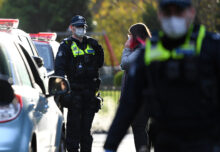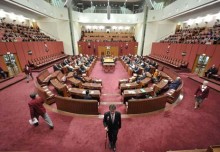This article was originally published by New Matilda on 13 January 2015.
The announcement of Chief Commissioner of Victoria Police Ken Lay’s resignation in early January has been met with accolades from Government, the Victorian community and even the Police Association about his three impactful years in the top job.
His progressive, personable and empathetic leadership style has been lauded by many and, in particular, his stance against the scourge of family violence has been named as his lasting legacy. It is a rare thing to have a public figure quitting to such universal acclaim.
Our little community legal centre in Melbourne’s inner-west has had a lot to do with Ken over the years, to the point where we are virtually on a first name basis these days.
In the thirty-five years since our little community legal centre formed we have seen out six Chief Commissioners. Kel Glare and Neil Comrie were at the helm during the period when Victoria Police shot eleven people dead in the late eighties and we spent years at Coronial inquests, supporting many of the victim’s families and campaigning for justice, accountability and changes in practices. We are used to writing to the Chief Commissioner’s office, mentioning them in dispatches, naming them in Freedom of Information requests or public interest law suits. All part of our increasingly appreciated police accountability work.
Accountability and integrity processes are critical to a democratic police service. As in most places around the world, it is often left to community and non-government organisations to seek accountability where or when institutional mechanisms fail or don’t exist. That’s the role we have been taking on for quite a few years now. And a cautiously respectful relationship has developed between us and Vicpol’s senior command over that time.
2006
Back in 2006, when we were supporting dozens of young African men coming into our centre with complaints of assault, racial abuse and constant harassment and street stops by police, Ken Lay was Assistant Commissioner of the North West Metro policing region.
AC Lay was in charge of the region where the controversial Operation Molto was conducted by the Flemington Police Station in early 2006, one of several Victoria Police operations around that time targeting young African-Australians in Melbourne’s inner north.
According to the police force’s operation order document, Molto was established to find criminality in young African-Australians living in or visiting the Flemington public housing estate. It was developed after a spate to armed robberies by a small group of young men of African appearance in the area.
It was Ken who, after a year or more of formal complaints to the then OPI, letters to Chief Commissioner Nixon, meetings and media articles, commissioned a review of the relationship between the police and the Horn of Africa community in Flemington. Inspector Mark Doney carried out the review in May 2006 which became known as ‘the Doney Report’.
In June 2006, Ken recognised the need to implement recommendations contained in the Doney Report. The strategies were aimed at improving community relations and policing practices.
The community relations program, however, was completely ineffective. It fell into the trap of locating the problem within the community rather than within the police. The logic was if you improve communications between police and the African community then the problems will go away. The analysis was wrong.
Our young clients were being abused, called ‘Black C**ts,’ and ‘N**gers, told to go back to Africa and under such intense policing it was impacting every aspect of their lives. Report after report was highlighting similar experiences across metropolitan Melbourne. Any response which failed to acknowledge and respond to this endemic, culturally entrenched racism, stereotyping and bias within the police were bound to fail. The community engagement programs adopted in many cases were little more than public relations.
The young African Australian men involved in the Haile-Michael case were not stopped because of what they were doing; many of the applicants did not hold a criminal record at the time the events occurred. Rather, they were stopped because the police officers wrongly assumed that they were more likely to be involved in criminal activity due to their physical appearance. This was racism. It took Ken many years to understand this.
2013
Ken’s role as Assistant Commissioner during this time was the reason that our legal team in the Hail-Michael race discrimination case, decided to subpoena him as a key witness on the scheduled first day of the Federal Court case. His legal battle to avoid appearing was front page of the Herald Sun in early 2013. Our QC Jeremy Rapke was preparing to question him about what steps he took after receiving the Doney Report, a central element of the case which sought to prove systemic discrimination by racial profiling under the Federal Race Discrimination Act.
The argument to have Ken appear in court was to be held on the first day of what looked like a three-week trial. But on Monday 18 February 2013, our six young clients, the Victoria Police and the eight police members named in the case reached an historical landmark agreement. In the settlement, which Ken would have signed off on, Victoria Police agreed to conduct a six-month, public inquiry into its field contact policies and cultural training programs. It was unprecedented.
Media reports at the time contained disturbing comments by the Chief Commissioner on the outcome of the Haile-Michael settlement. Those reports attributed to the Chief Commissioner a denial of the existence of ‘racial profiling’ in Victoria Police and a rejection of any reforms that embodied a ‘receipting’ policy similar to that seen in other jurisdictions, even before the inquiry had commenced!
It was unfortunate that Ken had decided to pre-judge the inquiry’s outcomes, as by the end of that year he found himself launching the Equality is not the same report which committed police to conduct the first ever 12 month trial of stop and search receipting in Australia.
Ken Lay’s public statements on racial profiling have changed considerably from 2013 to now.
In February 2013, the Chief Commissioner wrote in Melbourne’s Age:
While I don’t accept racial profiling exists in Victoria Police, there has been public criticism of police racial profiling or overly targeting members of the African-descent Australian community. Some believe they are being aggressively and unfairly targeted by police.
In May 2013 African Media Australia’s Clyde Salumu Sharady, arranged for Chief Commissioner Lay to sit down for a joint interview alongside Daniel Haile-Michael, the lead applicant in the Federal race discrimination case. Daniel had been assaulted by police in 2005 and was well versed in letting white folks know what it was like to be racially targeted by police. In the years before and after the case, Daniel had become one of several young leaders speaking out against racial profiling. In the hour-long interview Daniel and Ken spoke frankly and personably about the recent court settlement, the original incidents of abuse and discrimination and what Victoria Police was going to do about it. Daniel was challenging and clear and Ken listened. It’s a little known interview but highlights Ken’s much lauded style of personable communication.
It also demonstrated his skill in shifting the ‘frame’ to a positive, very palatable ‘solutions’ focus. The interviewer asks Ken why it took so long for Victoria police to respond to these issues when they came to light over eight years ago. He responded by blaming our civil case as an impediment, rather than the instigator of change that it clearly was. He was expert at speaking to the ‘frame’ of the problem being one of communication, trust and relationship with minority communities and shifting it away from any accusation of institutional racism.
But he was always extraordinarily gracious in this. Soon after the case he had described the six young men who brought the action as courageous, resilient and tenacious and “have done their community proud”.
Then, in early June 2013, the Herald Sun broke a story detailing the use by Sunshine Police of beer stubby holders that depicted Africans as ‘mud-fish’. It was yet another watershed moment it seemed for the Chief Commissioner. After years of ignoring or downplaying the complaints of our clients, these pale blue stubby holders were something he simply couldn’t explain away.
The use of these coasters in Sunshine and summarily abhorrent versions targeting Aboriginal people at the Bairnsdale police station indicated a culture of racist attitudes that no longer could be dismissed.
But it didn’t stop there. On 26 June 2013 it was reported that two female police officers had been suspended for taking what appeared to be a horribly racist ‘trophy’ photos of a Sudanese man in their detention.
The Chief Commissioner was reported as saying:
‘It has shown me there is a dark, ugly corner of Victoria Police and I don’t like it. … It embarrasses me and it should embarrass you. … [My] overwhelming feeling was just one of utter disbelief. A very worrying photo that I’ve seen that had displayed a part of the organisation that I didn’t like at all’.
“You’ll probably see significant action by Victoria Police against members who behave in an overtly racist way,” he told ABC Radio in Melbourne that day.
As a result of these incidents, and inspired by the very clear and much lauded public message condemning sexual assault in the military from the Chief of Army, Lieutenant General David Morrison, Ken produced a YouTube video.
In a similar tone to Morrison, Ken assertively condemned and drew a line against racist behaviour by Victoria Police members. The video was intended for members but also for the wider community. Whilst he didn’t name it directly in the video, Ken admitted the cultural and institutional aspects of police racism, stating that racist behaviour had been ignored, accepted and ‘sometimes may have been encouraged’ by others in the force. “I don’t think of a few bad apples’ he said, “I think of a failure of leadership and this can occur at any level.”
It was the closest a Chief Commissioner of Victoria Police had ever come to acknowledging institutional racism.
Since that time Ken’s leadership on shifting the internal police culture has been a lot more unequivocal. He clearly let his leadership group of Assistant Commissioners across Victoria know that there will be ‘zero tolerance to racism’ within Victoria Police, providing training and instructions directly to senior command level officers at a first step. He appointed the well respected Sue Clark as the Commander of the newly formed Priority Communities Division who would drive Vicpol’s Equality report commitments over the next three years.
The chief commissioner’s office has since aggressively pursued police members involved in the trophy photos and stubby holder incidents. Three members were sacked and ten others disciplined over the Sunshine stubby holders, the most recent action being petitioning the Supreme Court of Victoria in a new bid to sack Senior Constable Calum McCann who was reinstated after an appeal.
Prior to June 2013, Ken Lay had been reacting to these consistent accounts of racism from across Victoria as a failure of communication. Now at last he was starting to recognise how deep into the organisation the problems went.
2014
We knew that it was critical that Victoria Police as an institution understood what constitutes racial bias and racial profiling, how it is identified, and the nature of its impacts. In his decision to act strongly against these series of overtly racist incidents since the Haile-Michael case Ken was treading the line between meeting community expectations, and ensuring that he did not lose the support of rank & file members of the institution. His decision to show leadership and adopt a zero-tolerance stance was a welcome sign.
A clear articulation of racial bias and discrimination had been left out in VicPol’s communication so far. Ken Lay acknowledged that there is an issue of racial bias within Victoria Police but lost an opportunity to articulate how this links to bias and racism in the community generally, especially around narratives that associate blackness with criminality, the foundation of implicit or unconscious bias. An acknowledgement of this kind at that time would have reinforced the message that Victoria Police is genuinely motivated to change, to overcome these biases and uphold human rights.[2]
In July last year Ken launched the Human Rights Strategic Advisory Committee and the Priority Community Division as part of the Equality report commitments.
“It is the right of every Victorian to be treated fairly and with respect and dignity by their police” he said at the launch.
“Every Victorian must expect a police service that is culturally competent, ethical and professional… We will get better. With your help we will free our workforce of discrimination.”
The most recent formal communication we received from Ken was an apology. Coming soon after Victoria Police provided an apology to those subjected to abusive strip searches in raid on the Tasty Nightclub twenty years prior. Ken wrote a personal letter of apology to another of our high profile clients, Corinna Horvath. Corinna was brutally assaulted by a group of Victoria police in 1996, and after obtaining a significant decision from the United Nations Human Rights Committee earlier in 2014, was surprised to receive an ex-gratia compensation payment from the State of Victoria with an accompanying written apology from the Chief Commissioner.
The apology read, in part:
I deeply regret what occurred and sincerely apologise for the injuries you suffered as a result.
This was a significant outcome for Corinna Horvath and an unexpected but appreciated initiative from Ken.
2015
In early 2015, after the first year of the Equality Report commitments, Victoria Police are about to release its revised field contact policies, including, for the first time, a definition of racial profiling and will embed human rights and anti-discrimination measures within their policy rules for when police interact with the community. They are soon about to launch new anti-racial profiling training modules and the first ever pilot of stop & search receipting in inner Melbourne will start in the first quarter of 2015. Each of these demonstrate progress that we, and the community will be watching with interest.
We are under no illusions that things will change overnight. By themselves, progressive leadership and well-crafted policy documents will not eliminate long institutionalised and deeply embedded racist practices within an 160 year old organisation. But the raft of training, policy and accountability reforms committed to under Ken Lay’s purview in recent years, if implemented genuinely and wholly could mean real change.
As community lawyers and advocates, we understand that the role of the Chief Commissioner, as a modern leadership position, entails a great deal of public relations work, espousing progressive, widely shared views and positions, reassuring politicians and the public that we really do have a friendly, human rights compliant, democratic police force.
From our position we get to see how far these public statements are from the reality of the often brutal, abusive and racist interactions on Melbourne’s streets. We are cognizant of the danger that liberal policing reform often does little more than make state violence legitimate, and that police don’t just need more training or better procedures; it is more often a case that they have far too much power.
At least Ken had listened a little to Daniel Haile-Michael and has taken on board many of the community’s proposals for change.
The struggle against racialised policing still has a long way to go but Ken has taken Vicpol quite a long way. We hope that his successor will be able to ensure these vital reforms transform into operational practice on the streets of Victoria.
Although we have often been at loggerheads or on opposing sides of many a court room, we here at this tiny community legal centre agree with the praise and accolades for Ken. He has had a largely positive impact on policing in Victoria. His leadership over recent years has been welcome.
We wish Ken and his partner all the best.
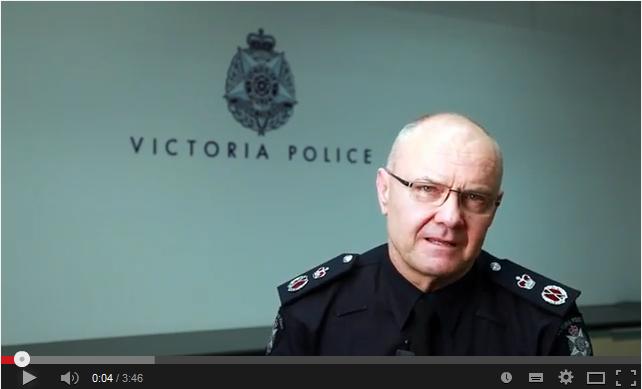
Chief Commissioner Ken Lay speaking on racism and bullying in the Victoria Police June 2014
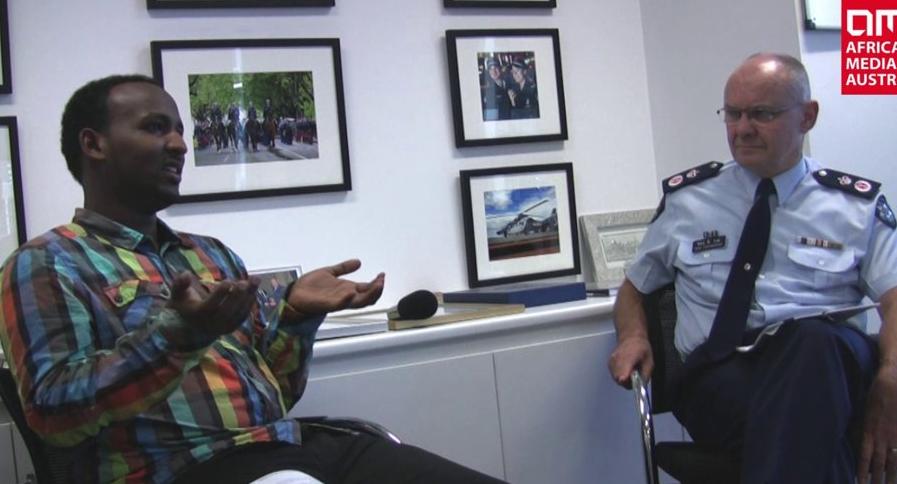
Daniel Haile-Michael and Ken lay being interviewed by Africa Media Australia. May 2013
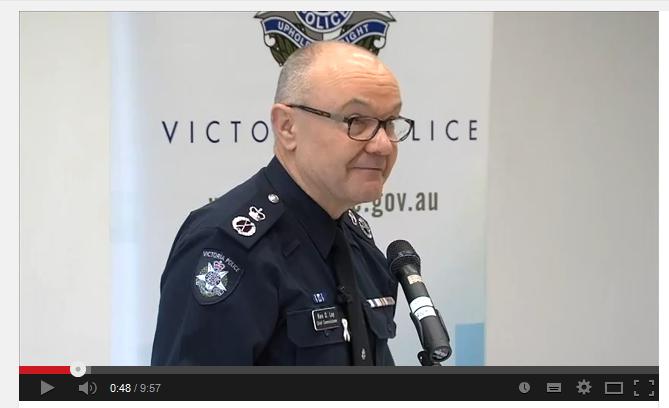
Chief Commissioner Ken Lay speaking about the Equality Report 15 July 2014

